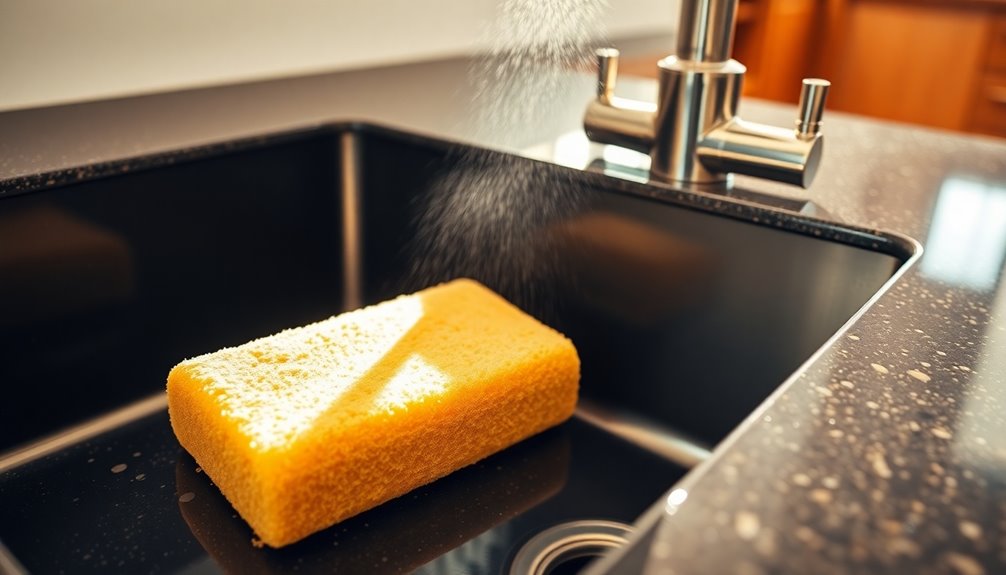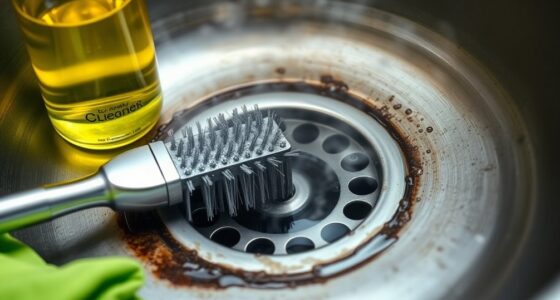To clean your granite composite sink, start with daily maintenance using mild dish soap and a soft sponge. Rinse well and dry with a cloth to prevent water spots. For deeper cleaning, sprinkle baking soda, spray with a vinegar solution, and scrub gently. Use food-grade mineral oil for extra shine. Always avoid harsh chemicals and abrasive scrubbers. With proper care, your sink can stay beautiful and stain-free—there's more to discover about its upkeep!
Key Takeaways
- Clean daily with mild dish soap and a non-abrasive sponge to prevent stains and buildup in your granite composite sink.
- For deep cleaning, sprinkle baking soda and spray a vinegar solution; scrub gently and rinse thoroughly.
- Apply food-grade mineral oil regularly to enhance shine and protect the sink's surface from stains.
- Avoid abrasive materials and harsh chemicals to maintain the sink's finish and prevent scratches.
- Promptly clean spills, especially in white sinks, to avoid staining and use dedicated cleaning tools to prevent cross-contamination.
Daily Cleaning
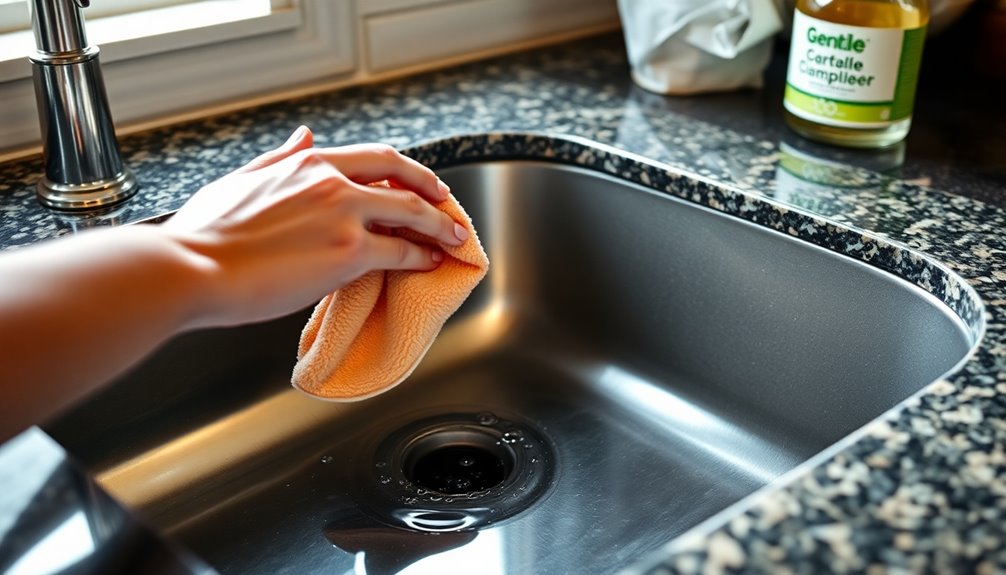
To keep your granite composite sink looking its best, clean it after every use with mild dish soap and a non-abrasive sponge. This simple routine helps prevent stains and buildup.
After scrubbing, rinse your sink thoroughly with warm water to remove any soap residue, ensuring a clean surface. To avoid water spots and maintain that shine, dry the entire sink surface with a soft cloth right after cleaning.
Establishing this daily cleaning habit will help prevent hard water stains and soap film buildup. If needed, use a dedicated composite sink cleaner or a vinegar solution for extra shine and to eliminate odors.
Deep Cleaning Techniques

While daily cleaning helps maintain your granite composite sink, deep cleaning is essential for tackling stubborn stains and odors.
Start by sprinkling baking soda evenly over the surface to lift those tough spots. Next, spray a 75/25 solution of white vinegar and water to create a fizzing reaction that breaks down grime.
Gently scrub the sink with a soft sponge and an old toothbrush, reaching into corners and crevices where dirt hides. Rinse thoroughly with warm water to remove all residues, preventing buildup that dulls the surface.
After rinsing, allow the sink to air dry or wipe it down with a soft cloth. For added protection, apply a thin layer of food-grade mineral oil to maintain its appearance.
Stain Removal Methods
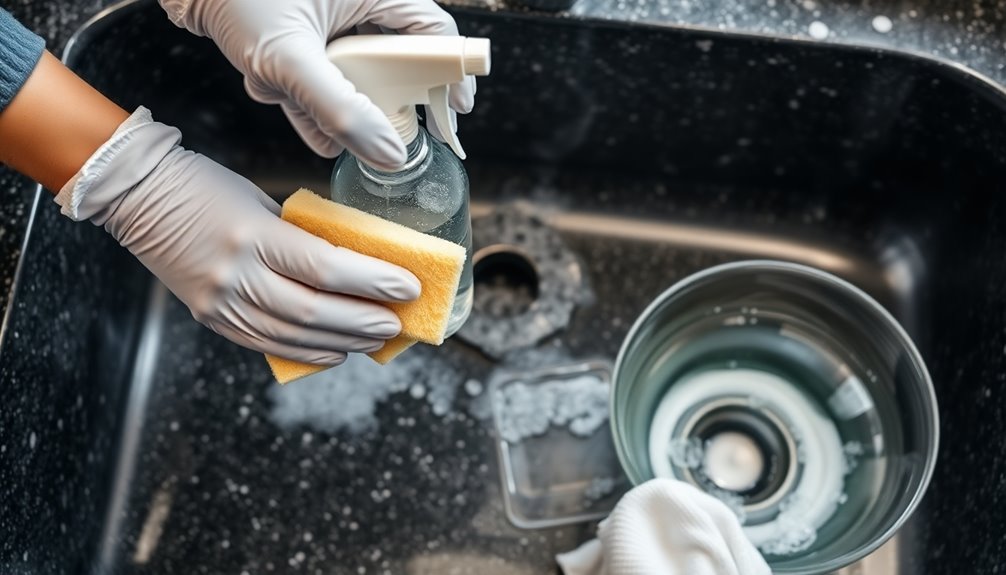
When it comes to removing stains from your granite composite sink, two effective methods stand out: a baking soda paste and a diluted bleach solution.
You can create a paste with baking soda and water to tackle stubborn marks, or use a 50/50 bleach mixture for tough stains.
Always remember to rinse thoroughly afterward to keep your sink looking its best.
Baking Soda Paste
If you're dealing with tough stains on your granite composite sink, a baking soda paste can be an effective solution.
To create this paste, mix equal parts of baking soda and water until it reaches a thick consistency. Apply the baking soda paste directly to the stained area, ensuring it covers the stain completely.
Let it sit for about 10-15 minutes to allow the mild abrasiveness to work its magic on stubborn stains. Gently scrub the area using a soft sponge or cloth, which helps lift the stain while keeping your sink safe.
After scrubbing, rinse thoroughly with warm water to remove any residue behind, leaving you with a clean and streak-free finish.
Bleach Solution Application
For those stubborn stains that just won't budge, a bleach solution can be an effective method to restore your granite composite sink's appearance.
Mix equal parts bleach and water, then let the solution sit in the sink for one hour. Afterward, scrub the stubborn spots gently with a non-abrasive pad.
Remember to:
- Test the bleach solution on a small, inconspicuous area first.
- Rinse thoroughly after scrubbing to verify no bleach residue remains.
- Limit bleach use to occasional maintenance, as frequent application can dull the sink's surface.
For regular cleanliness, opt for milder cleaners designed for composite sinks.
This balanced approach will help maintain your sink's beauty and prolong its lifespan.
Tips for Maintaining Luster
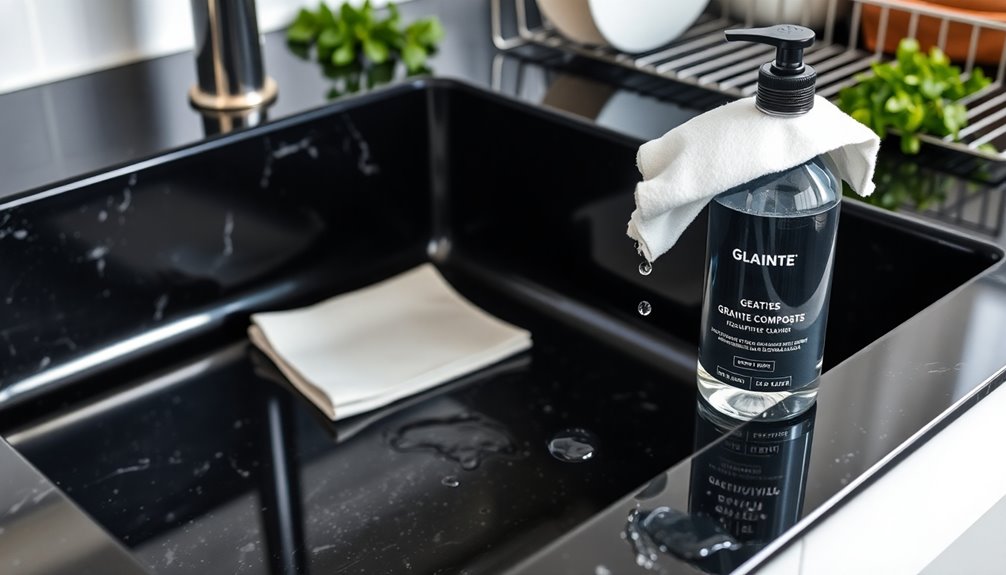
To keep your granite composite sink looking its best, regular maintenance is key.
Start by using a non-abrasive cleaner specifically designed for composite sinks, like BLANCOCLEAN, to maintain a polished appearance without damaging the surface.
After each use, wipe the sink dry with a clean, soft cloth to avoid water spots and soap film buildup.
Additionally, regularly apply food-grade mineral oil to enhance shine and protect against stains and mineral deposits.
Remember to steer clear of harsh chemicals and abrasive scrubbers, as they can dull the finish.
Avoiding Common Mistakes
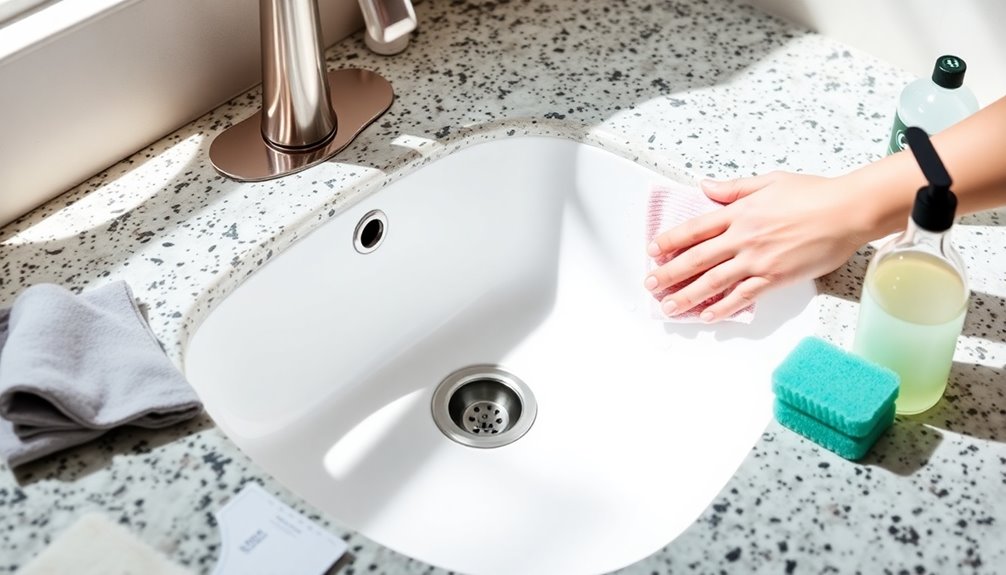
When cleaning your granite composite sink, it's essential to avoid common mistakes that can lead to damage.
Don't use harsh chemicals or abrasive tools, as they can scratch the surface and degrade its appearance.
Also, make sure you don't neglect daily maintenance, which is key to keeping your sink looking its best.
Using Harsh Chemicals
Cleaning a granite composite sink requires care, especially when it comes to avoiding harsh chemicals.
These substances can damage the surface and lead to unsightly discoloration. To maintain cleanliness without risking your sink's integrity, always choose specifically designed cleaning solutions.
Here are some key points to remember:
- Avoid using bleach or ammonia, as these can harm the finish.
- Steer clear of abrasive scrubbers, like steel wool, which scratch the surface.
- Never mix different cleaning products; this can create harmful reactions.
Neglecting Daily Maintenance
While it might seem harmless to skip daily maintenance, neglecting your granite composite sink can lead to significant problems over time.
When you fail to rinse and dry the sink after each use, you create an environment for water spots and mineral deposits. These can build up and lead to stubborn stains that require harsh cleaning methods, which risks damaging the sink's finish.
Additionally, neglecting regular cleaning allows food particles and grime to accumulate, harboring bacteria and compromising hygiene.
Establishing a consistent cleaning routine not only enhances the sink's aesthetic appeal but also extends its lifespan.
Abrasive Cleaning Tools
Using the wrong cleaning tools can quickly turn your granite composite sink from a shining centerpiece to a scratched eyesore.
Avoid abrasive tools like steel wool and harsh scrub pads, as they can damage the non-porous surface. Instead, opt for gentle cleaning methods to maintain your sink's integrity.
- Use soft sponges or microfiber cloths for daily cleaning.
- For stubborn stains, choose a soft scouring pad designed for delicate surfaces.
- Always verify that your cleaning agents are compatible with granite composite sinks to prevent damage.
Special Care for Black and White Sinks
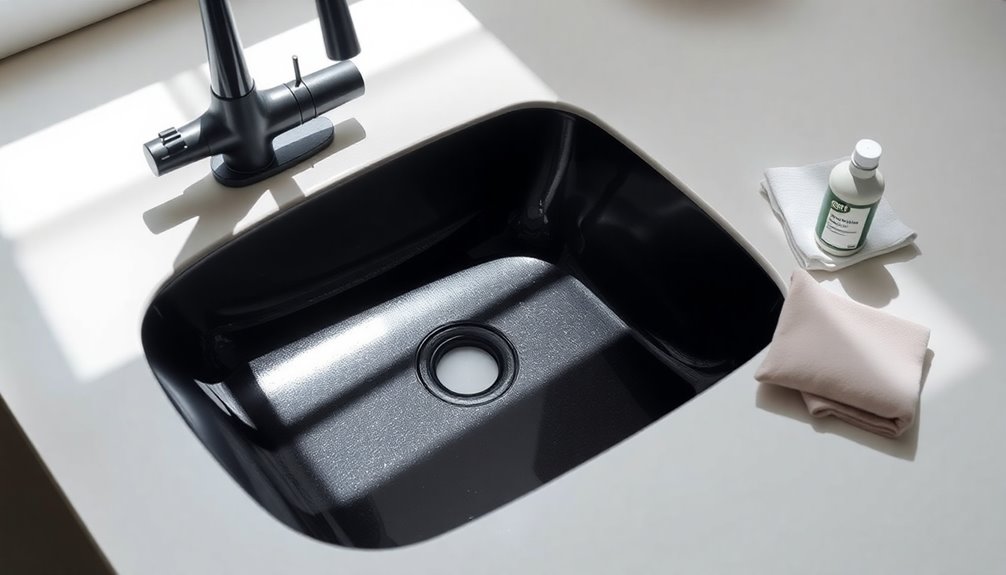
To keep your black and white granite composite sinks looking their best, it's vital to understand their specific care needs. Black granite composite sinks are prone to showing hard water stains and soap scum, so daily cleaning with non-abrasive cleaners is essential. For these sinks, use dedicated cleaning solutions and nylon brushes to avoid scratches. On the other hand, white granite composite sinks are susceptible to staining from dark liquids, so clean spills promptly. Gentle care is key; avoid harsh chemicals and opt for natural cleaning solutions instead. Always rinse thoroughly after cleaning and dry with a soft cloth to eliminate water spots.
| Sink Type | Cleaning Method | Caution |
|---|---|---|
| Black Granite | Non-abrasive cleaners | Use nylon brushes |
| White Granite | Natural cleaning solutions | Avoid harsh chemicals |
| Both | Rinse thoroughly, dry softly | Prevent water spots |
Handling Hard Water Stains
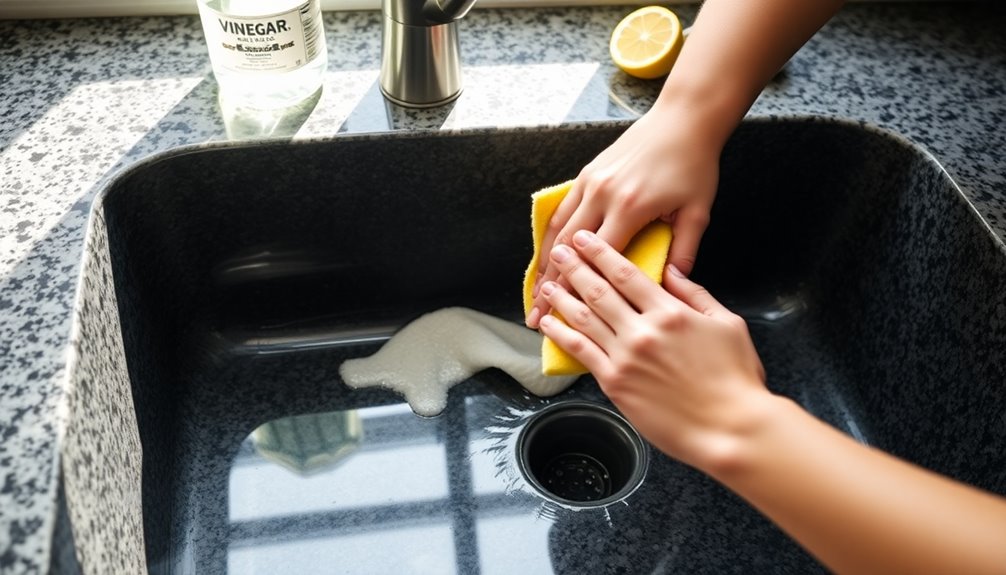
Hard water stains can be a persistent nuisance on granite composite sinks, but you can effectively tackle them with a simple vinegar solution.
Mix equal parts white vinegar and water in a spray bottle, and apply it liberally to the stained areas. Let it sit for 15-30 minutes to break down the mineral deposits.
Afterward, grab a damp microfiber cloth or a soft sponge to gently scrub the surface. Don't forget to rinse thoroughly with warm water to remove any remaining solution.
For tougher stains, soak the sink with vinegar for up to 30 minutes.
To prevent future hard water stains, consider these tips:
- Regular maintenance with mineral oil
- Immediate cleaning of spills
- Use a water softener if possible
Manufacturer Recommendations
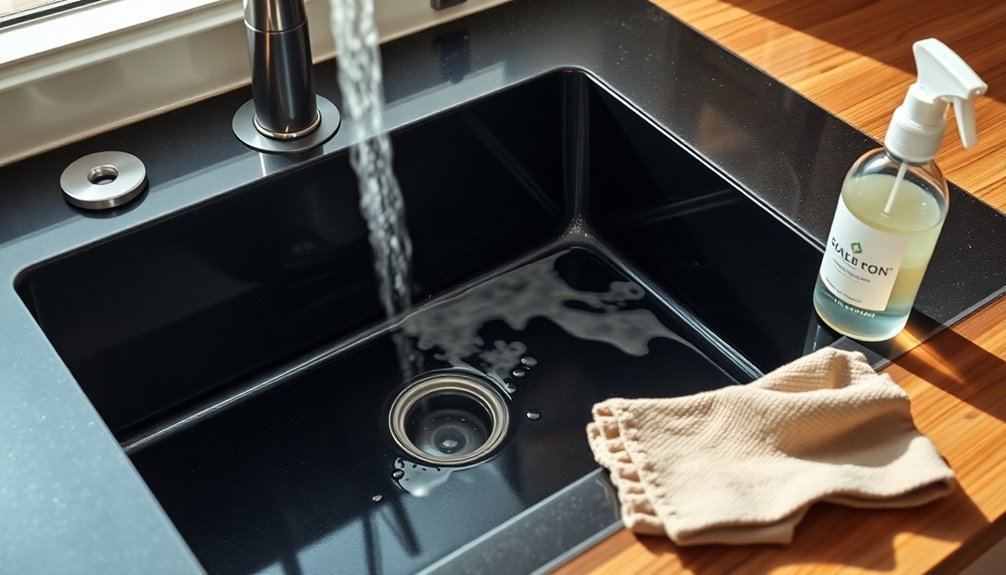
Maintaining a granite composite sink goes beyond just tackling hard water stains; it's important to follow manufacturer recommendations for cleaning and care.
Always refer to the specific manufacturer guidelines for cleaning products tailored to granite composite sinks, as formulations may vary. For instance, Ruvati suggests using gentle, non-abrasive cleaners and steering clear of harsh chemicals like bleach or ammonia to protect the sink's surface.
Daily cleaning should involve a soft sponge or cloth, avoiding abrasive materials that can scratch the finish. Before using any non-manufacturer cleaning products, test them on a small, inconspicuous area first.
Regular maintenance according to manufacturer instructions can greatly extend the life and appearance of your sink, keeping it in ideal condition.
Frequently Asked Questions
What Do You Use to Clean a Composite Granite Sink?
To clean a composite granite sink, you'll want to use mild dish soap and a soft sponge or cloth. This keeps the surface scratch-free and looking great.
For stubborn stains, make a paste of baking soda and water, apply it gently, and rinse well.
To tackle hard water stains, mix equal parts vinegar and water, spray it on, let it sit, then wipe clean.
Avoid harsh chemicals and abrasive scrubbers to protect your sink.
What Not to Use on a Granite Composite Sink?
Imagine a beautiful landscape, only to see it marred by harsh storms.
That's what happens when you use the wrong products on your granite composite sink.
Don't let abrasive materials like steel wool or harsh chemicals like bleach steal its shine.
Avoid caustic solutions that can erode its beauty, and keep wet sponges away to prevent stains.
Protect your sink as you'd cherish a vibrant garden—nurture it, don't harm it.
How Do You Make a Composite Sink Look New Again?
To make your composite sink look new again, start by deep cleaning it with a baking soda and water paste.
Let it sit on tough stains for a bit before gently scrubbing. After rinsing, use a dedicated cleaner like BLANCOCLEAN to restore its shine.
If you notice mineral deposits, soak the sink in a vinegar solution, scrub, and rinse.
Finally, apply a thin layer of food-grade mineral oil for added protection and luster.
Are Granite Composite Sinks Easy to Keep Clean?
Yes, granite composite sinks are easy to keep clean! Their non-porous surface resists stains and scratches, making maintenance a breeze.
Just use mild dish soap and a non-abrasive sponge for regular cleaning. Daily rinsing and drying with a soft cloth will help you avoid water spots.
For tougher stains, a baking soda paste or vinegar solution can work wonders.
Conclusion
In the grand symphony of your kitchen, a clean granite composite sink shines as the star soloist. By following these cleaning techniques and maintenance tips, you'll guarantee it remains a radiant centerpiece, reflecting both beauty and practicality. Remember, a little care goes a long way in preserving its luster. Treat it with respect, like a treasured instrument, and it'll serve you well for years to come, harmonizing perfectly with your culinary creations.
